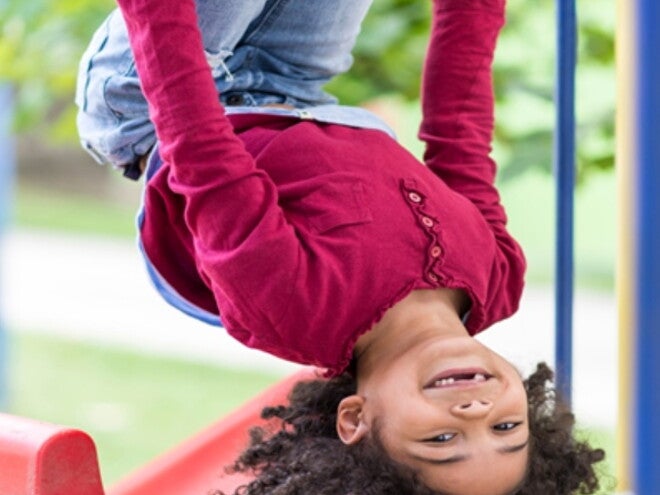
58 Months Milestone
Free play is like love, sunshine and broccoli all juiced together
When young children play freely, they instinctively handle physical objects and use their bodies to do things that enable them to notice patterns and discover the attributes of things, so that they can learn more about their physical world.
This explains why they never grow tired of climbing into cosy spaces such as boxes and cupboards, and why they love building enclosures and tents. Psychologists say this need to “enclose and envelope” also drives them to constantly fill containers such as cups, bowls and purses with nearby objects.
Young children also love to place their bodies in special positions as they play, so that they can view the world from an alternative perspective. They instinctively want to get into interesting positions by hiding under furniture, hanging upside down from jungle gyms, looking at the world through a magnifying glass and climbing high.
Limit screen time
To maximize its owner’s chances of survival and save energy, a young developing brain wires itself to only respond to the demands that are placed on it. This explains why children, who only have interactions with adults who speak Italian, won’t learn any English. Furthermore, children who only play ball with their parents or teachers will develop ball skills and not swimming skills.
Children acquire some skills through experiences
Children need certain experiences to acquire the skills they need for school readiness, sports and in life.
- Children need a sense of emotional security. When children do not experience enough loving interaction with the important people in their lives, their lower (emotional) brain regions are not in the right space. The resulting stress overwhelms their brains to the point where the higher, thinking regions switch off. This is known as “amygdala hijacking”.
- Children need a language rich environment. Betty Hart and Todd Risley reported that parents, who frequently have conversations with children, have three-year-olds with an average vocabulary of 1116 words, compared to 525 words of children whose parents do not really talk to them much. Another study, led by Dimitri Christakis, reported that the average number of words spoken in a household drops from 941 to 171 words when a television is switched on in the background.
- Children need space and opportunity to experiment with physical movement. This helps them to develop a good sense of timing, direction and body awareness. This includes where their body parts are, what they can do and how much space and pressure is needed for different movements. A lack of body awareness leads to a myriad of learning difficulties that impact negatively on reading, writing and understanding mathematical concepts later on.
- Children need to engage with people who help wire their thinking brains. Lev Vygotsky helped us to understand that children learn skills and develop a sense of identity when adults instinctively notice what they can do and then raise the bar slightly. This encourages them to practice new skills that are within reach. Teaching a child how to peel a banana, play nicely with a friend, or play snakes and ladders all fall into this category.
- Children need to play freely and express innate play patterns. Jean Piaget explained that children instinctively use their bodies and hands to transport, transform, propel, rotate, enclose, order, position, connect and disconnect physical objects as they play. These “schema explorations” of “play patterns” provide them with all the puzzle pieces they need for developing intellectually.
- Children need opportunities to master their world in practical ways. Maria Montessori said that children approach challenges in age-specific ways, and they have a natural tendency towards order and competence that drives them to master practical challenges and understand new concepts at their own, self-motivated pace. As they use their hands, their thought world expands. That’s how they learn to focus their attention to concentrate and move from concrete thinking to abstract reasoning.
Watching TV is a sedentary activity that limits the learning environment that children need most. Therefore, it is best to limit time in front of the television.
Tip: The value of fairy tales
Few parents read traditional fairy tales to pre-schoolers. However, a number of psychologists believe they are wonderful tools for preparing children for life.
They believe that fairy tales incorporate drama, excitement, sadness, fighting and fears which in turn make it possible for children to face their own fears and other negative emotions on a symbolic level, without having to experience the feelings first hand.
Interestingly, fairy tales in story books are not scary to children because they filter how they visualise what they hear and see in the illustrations with their immature frame of reference.
Those same stories would be scary on film, as the film visualises the story for the child.
Reference: Bruno Bettelheim, “The Uses of Enchantment: The Meaning and Importance of Fairy Tales”, Random House, (1976).